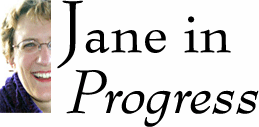 |
|
 |
 |
Looking for tips and tricks to the art of writing for television? Welcome to the blog of experienced television writer Jane Espenson. Check it out regularly to learn about spec scripts, writing dos and don'ts, and what Jane had for lunch! (RSS:  ) |
|
|
Home » Archives » July 2008 » Playing with the Prose
[Previous entry: "A Quick Word"] [Next entry: "Making People Fast"]
07/05/2008: Playing with the Prose
I've written on this topic before, but since it's a revelation I keep having, it seems like it's worth talking about again. There is tremendous value in writing out your stories in prose form before you begin writing. Write the A-story straight through and then do the same for all B-stories or even runners. It's easy to grow enchanted with the transitions and themic connections between your stories and fail to notice that something within one of the stories isn't working until you write it out as if it were going to be played straight through.
There's another reason to do this, that I'm just now realizing, and it has to do with the nature of prose versus script or even outline-style writing. When you're telling a prose story, you have to be very explicit about the subtextual stuff that won't be explicit in what is seen and heard. I'm talking about sentences like "this is the moment in which our hero realizes that he's been unfair," or "with this event, we sense that the tide of the war is turning." These are the things that sometimes seem unimportant in a script because they're relegated to the sometimes-ignored stage directions, or because they're such an evident presence that they never have to be said at all. But they loom large in prose story-telling of the type I'm talking about and they keep you focused on the most important part of script-writing: the sense of WHY IT'S IMPORTANT TO TELL THIS STORY.
The big turns, the realizations, the take-away emotional impact of the story are contained in all that unspoken stuff that makes up the bulk of a prose-style story document, but which remains discreetly behind the curtains in the script. Tracking it is crucial, but it can be elusive. There's no cure for that as good as writing it the heck down. In order.
THEN, of course, rearrange what you've done into a standard outline, with all the scenes in the actual order they'll appear in the script and with some thought given to transitions. You don't get to skip that step.
Lunch: cheese, olive pate, avocado and one of those tiny loaves of French bread
|
|
|
 |
|
Get Blog Updates Via Email
|
|
 |

